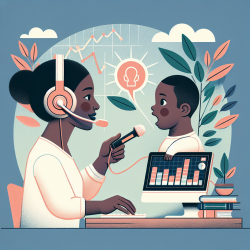Introduction: The Role of Speech Language Pathologists in School Culture
As Speech Language Pathologists (SLPs) working in schools, you are pivotal in shaping an inclusive and supportive school culture. By leveraging data-driven decisions, you can enhance the educational experiences of children, particularly those with speech and language disorders. This blog explores how SLPs can use data to foster a positive school culture and improve outcomes for students, especially those with autism.
Data-Driven Decisions: The Key to Effective Speech Therapy
In the realm of speech therapy, data is not just a tool; it is a compass guiding us toward effective interventions. By analyzing student performance data, SLPs can tailor therapy sessions to meet individual needs, track progress, and adjust strategies accordingly. This approach is particularly beneficial in telepractice jobs, where therapists can utilize digital tools to gather and analyze data efficiently.
Building an Inclusive School Culture
An inclusive school culture is one where every student feels valued and supported. For children with autism, speech therapy plays a crucial role in fostering communication skills, which are essential for social interaction and academic success. By integrating data-driven speech therapy into the school culture, SLPs can ensure that these students receive the personalized support they need.
- Utilize data to identify communication barriers and tailor interventions.
- Collaborate with teachers and parents to create a supportive environment.
- Regularly review data to assess the effectiveness of interventions and make necessary adjustments.
The Impact of Online Therapy Services
Online therapy services, such as those provided by TinyEYE, have revolutionized the way SLPs deliver therapy. By offering flexible and accessible services, online therapy can reach students who may otherwise face barriers to receiving support. This is particularly important in remote or underserved areas, where telepractice jobs can bridge the gap in service delivery.
Moreover, online platforms provide SLPs with tools to collect and analyze data in real-time, enhancing their ability to make informed decisions. This data-driven approach not only improves therapy outcomes but also contributes to a positive and inclusive school culture.
Next Steps: Embracing Data-Driven Speech Therapy
As an SLP, you have the power to transform school culture by embracing data-driven speech therapy. Here are some steps you can take to get started:
- Invest in professional development to enhance your data analysis skills.
- Collaborate with online therapy providers like TinyEYE to access digital tools and resources.
- Engage with your school's administration to advocate for data-driven practices.
- Share your success stories with colleagues to inspire a culture of continuous improvement.
By taking these steps, you can contribute to a school culture that values inclusivity and data-driven decision-making, ultimately improving outcomes for all students.










